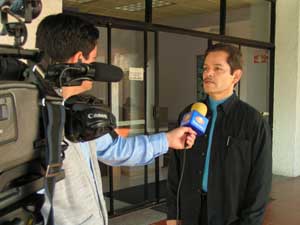-
- Radical right files language for Calif. same-sex marriage ban
- Michigan students suspended for rest of school year over ‘Love’ graffiti
- Senate sends same-sex marriage ban to Texas voters
- Michigan students suspended for rest of school year over ‘Love’ graffiti
- U.S. Attorney from Seattle to investigate embattled Spokane mayor
- American Psychiatric Association calls for same-sex marriage recognition
- Mass. Democrats formally endorse same-sex marriage
- National News Briefs
- World News Briefs
san diego
Anti-homophobia radio spots launched in Mexico
Move follows last year’s ground-breaking change to anti-discrimination laws
Published Thursday, 26-May-2005 in issue 909
A change to Mexico’s anti-discrimination laws has sparked a landmark radio campaign to promote greater acceptance of sexual diversity throughout the country.
The experimental radio spots are funded by the National Council for the Prevention and Elimination of Discrimination (CONAPRED), which formed following an amendment to the Mexican Constitution in September 2004 that included “sexual preference” to existing anti-discrimination laws.
The two 30-second radio segments have been broadcast on two radio stations in nine large Mexican cities as of May 2, with eight more to be targeted in the coming months. One radio spot illustrates a mother showing acceptance for her son’s boyfriend during a family meal. In the other, a commentator explains what homophobia is and urges tolerance. The radio spots will run until July.
The Mexican National Center for the Prevention and Control of AIDS (CENSIDA) has sponsored the $500,000 campaign, and hopes education and a greater acceptance of the Mexican GLBT community will positively impact Mexico’s HIV/AIDS epidemic.
“Those of us who have been involved with the fight against AIDS have been telling our authorities that fighting discrimination and homophobia is key to having successful AIDS programs,” said Emilio Velasquez, a gay and human rights activist. “Finally, they’ve realized that it’s more expensive to treat than to prevent.”
Velasquez said risky behavior within Mexico’s GLBT community, such as alcohol and drug abuse, refraining from safe sex and not complying with protocols for HIV medication, could all be lessened if the community felt accepted and if a greater sense self-worth was encouraged.
Velasquez concedes that campaigners and the government have their work cut out for them.
“Homophobia left unchecked leads to homicides,” Velasquez said. “An agency specializing in homophobic crimes, operating in Mexico City, has documented 300 cases since the early ’90s, but they say that for every documented case there are at least three more that have not been [reported].
“Here in Tijuana I am aware of many, many of my friends – at least 15 – that have been murdered [because of homophobia],” Velasquez continued. “I’ve always been aware that I could be easily murdered, that’s why I have to take the opportunity that I am alive and healthy and get on with it, because nobody else will.”
He added, “I’m committed to the cause and feel solidarity for those who can no longer speak because they are dead. So many of my friends. And nobody protested; nobody seemed to care.”
Velasquez also claimed a United Nations human rights specialist called the murders “executions sanctioned by the state” when she visited Mexico last year, pointing to the lack of investigation into homophobic-related killings.
Launch of the radio campaign coincided with the fifth anniversary of a Tijuana police raid on a Villa Playas bed and breakfast, in which eight gay men were arrested and imprisoned on trumped-up charges when they refused to pay a $10,000 police bribe.
All of the men, except American Richard Wilson, were eventually released and all charges were dropped after a lengthy legal battle.
Richard Wilson, a decorated ex-service member, has served five years of a six-year prison term for corruption of a minor. The minor in question was a 17-year-old male he met in a gay bar.
Velasquez, who helped defend the group in court, said Wilson is still in jail because “he has a quadruple-whammy of discrimination: he’s a foreigner, African-American, gay and HIV-positive.”
Despite the $500,000 start-up cost of the Mexican anti-homophobia radio campaign, there’s still not enough funding to reach all the cities benchmarked, though organizers expect further support once initial responses to the campaign have been gauged.
“People need to realize that it’s not enough to come down to Tijuana and march on Gay Pride day,” Velasquez said. “We need to roll our sleeves up and go to work. That’s the only way to turn things around. We have no funding, no resources, and no one seems to care. We’re being led to the slaughter and no one complains.”
To offer aid, such as used printers and telephones, office supplies, technical assistance, or time call Velasquez’s gay and human rights campaign at 011 52 664 688 0267.
|
|
Copyright © 2003-2025 Uptown Publications


